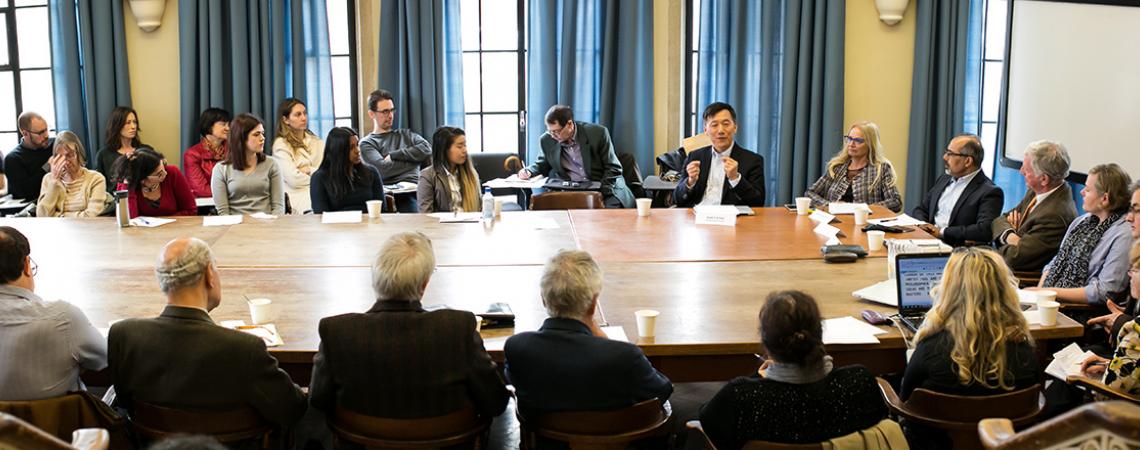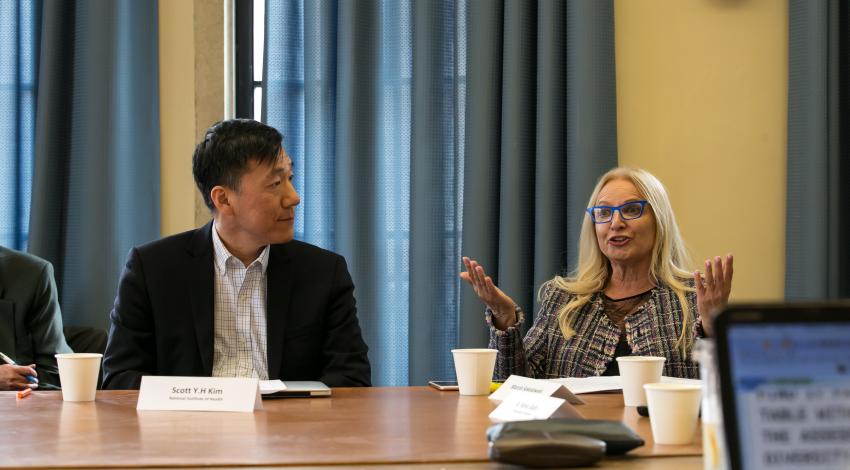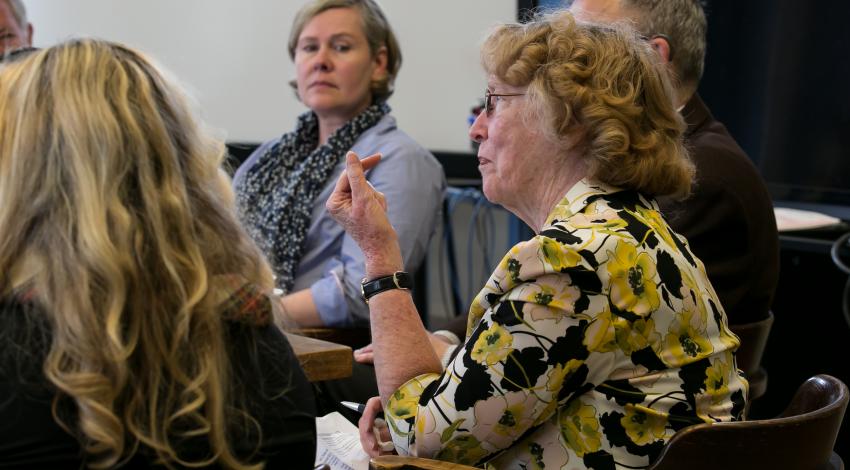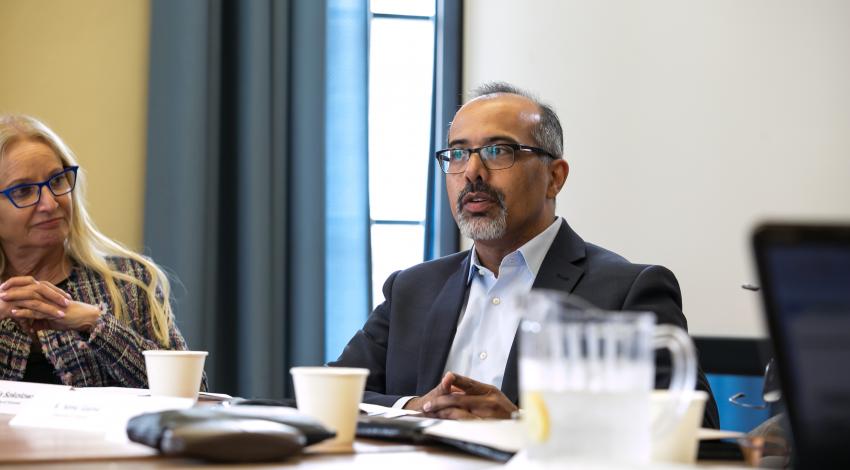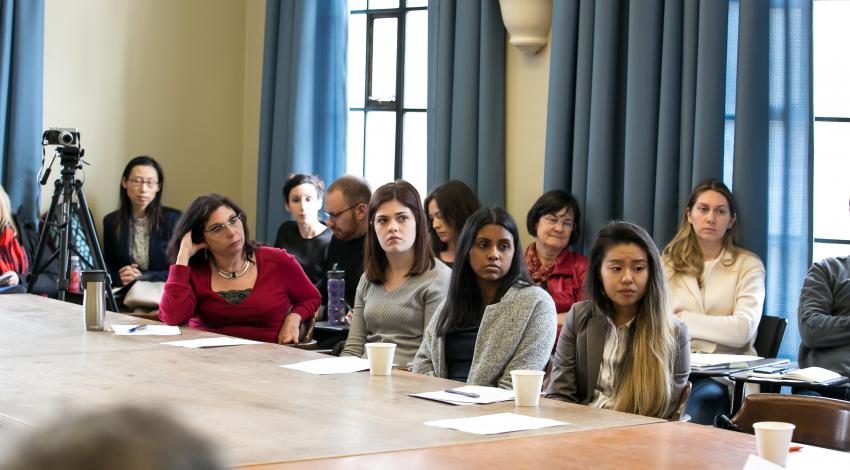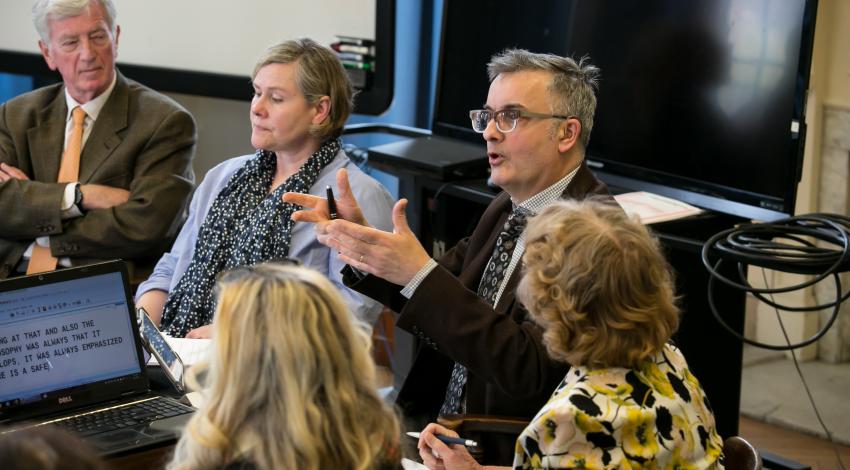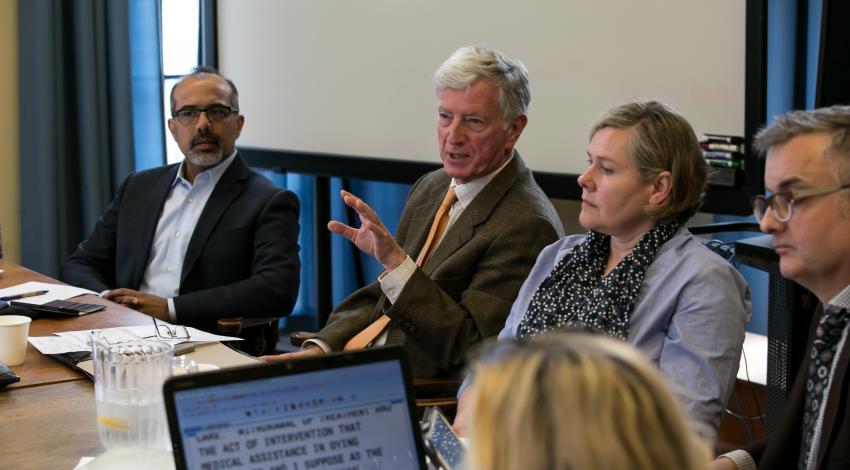Can – and should – we expand the Medical Assistance in Dying act to people with mental illness and dementia?
Panel experts raise more questions than answers at law seminar
By Peter Boisseau / Photos by Dhoui Chang
A roundtable discussion on whether Canada’s euthanasia law should be expanded instead veered into a debate about lack of access to quality health care, underscoring concerns about the existing Medical Assistance in Dying (MAID) act and many related issues.
The recent seminar at U of T Law aimed to explore if the law should be amended to make MAID available outside the context of end-of-life, focusing on individuals who want to obtain MAID for mental health conditions and those who want to make an “advance request” to obtain MAID when they will be suffering from Alzheimer’s and no longer capable of decision-making.
But time and again, the discussion was drawn back to focus on such things the chronically underfunded mental health care system in Canada, or the unequal access to quality palliative care.
“What the seminar showed in a way is that many people are still struggling with the current practice in the Canadian context and the uncertainty and stress around it,” said Trudo Lemmens, U of T Professor and Scholl Chair in Health Law and Policy, in an interview after the debate.
“People are worried about the current lack of access to good mental health care, and there are others who argue we also have very big challenges with end-of-life care and care for people who suffer from dementia.”
The federal government’s Bill C-14, passed in 2016, allows adult Canadians to request physician-administered euthanasia or assisted suicide, but only when they are in an advanced state of irreversible decline and their death is reasonably foreseeable.
To receive medically assisted death, patients must sign a written request expressing their wishes at least 10 days before the date of death, and in front of two independent witnesses who can both confirm it was done willingly and free of coercion.
The discussion at Falconer Hall included several members of a Council of Canadian Academies Expert Panel that recently tabled three reports in parliament analyzing the potential for expanding MAID. Their report laid out evidence and surveyed other jurisdictions and laws but had no mandate to issue recommendations.
The last time the numbers were tallied in the middle of 2018, approximately 3,700 people had ended their lives under the MAID legislation, said Dr. Harvey Schipper, U of T Professor of Medicine and adjunct professor at U of T Law, and a member of the CCA Expert Panel.
Over the last few years, some of the major court cases that eventually led to the current legislation have also touched off discussion in a range of debates that just continue to grow, Schipper said.
The complex range of issues that have become caught up in the debates have all flowed from the otherwise apparently straightforward notion that someone should be able to have their life medically ended under legally defined circumstances, he said.
“The range of those circumstances is being tested in the courts and in practice around this country as we speak.”
Schipper referenced examples such as Montreal landscape architect Archie Rolland, who chose to end his life after an administrative decision was made to move him to another institution which did not provide the same level of care he had been receiving at the facility where he was residing.
“That situation put a fundamental issue right on the table,” said Schipper.
“There are a whole bunch of concerns that come out of this debate. In fact, there is a case being put forward saying that palliative care should covered by the Charter of Rights and Freedoms, just like euthanasia.”
Those concerns are among the reasons why any debate about assisted dying is so layered and complicated that it seems to defy straightforward answers, Schipper said.
There is also is a lot of confusion among Canadians about what the current law says and whether life-saving medical treatment is required, even in cases where it is against the patient’s wishes.
“There is a distinction between saying, ‘I don’t want any more care,’ and withdrawing treatment and the active intervention of assisted dying. People can’t be forced to take treatment, they can always say no,” he said.
Others panelists noted there is evidence that the patients currently requesting MAID are not necessarily people who are desperate and vulnerable because they’ve fallen through the cracks in the health care system and see no other recourse.
Dr. Donna Stewart, a U of T professor and member of a University Health Network MAID implementation team, said only two of the well over 100 cases she has assessed involved patients in vulnerable situations. Stewart said she was surprised to find the overwhelming majority of MAID applicants were actually affluent and powerful.
“They are usually highly effective and successful people, like lawyers, doctors and industry leaders, who want to be in control of their deaths the same way they controlled their lives,” said Stewart.
“We’re seeing people who have access to excellent care and yet they say this isn’t the life they want. And they are very clear about it, and they often thought about it long before they became ill. It wasn’t what I expected to see.”
But if Canada expands its law to include people with mental illness, for example, it will have the most permissive MAID in the world, said Dr. Sonu Gaind, Associate Professor of Psychiatry at U of T and Chief of Psychiatry at Humber River Hospital.
That’s because other countries that currently permit assisted dying for the sole criterion of mental illness require there be a joint consensus between the doctor and the patient. Under the Canadian legal process, all that likely would be required is the patient’s belief that the treatments being offered do not adequately relieve their suffering.
“Other countries that allow MAID for mental illness also have a requirement that there has been some sort of history of treatment that has proven ineffective, so you can make a clinical determination that based on this history, the patient can’t get better,” said Gaind.
“Under our system, if the MAID law were expanded, there wouldn’t be any such requirement, and no need for a demonstrated history of attempted treatment. It would be entirely subjective. The sole criterion for applying would be having a mental illness.”
By the time the roundtable came to an end, Lemmens was somewhat disappointed but philosophical.
“We didn’t really discuss in detail what would happen if we were to expand the practice to include MAID for reasons of mental health and in the context of dementia because people are still struggling with questions about what is currently going on,” said Lemmens.
“People are looking for solutions, whereas my view is maybe sometimes there is no perfect solution to the challenges that we have. Sometimes by trying to offer a solution, we may create much bigger problems.”
The debate was part of the Mary and Philip Seeman Health Law, Policy, and Ethics Seminar Series, and at a reception following the roundtable, Lemmens took the opportunity to thank the Seeman family’s members attending the event for their support.
He noted their support allowed the health law seminar series to expand this year, including a large and well-attended public conference on the regulation of assisted human reproduction in Canada. The family’s donations have also allowed the posting of the series online to make it accessible to a broader audience.
Click below to watch the video of the Round Table discussion
